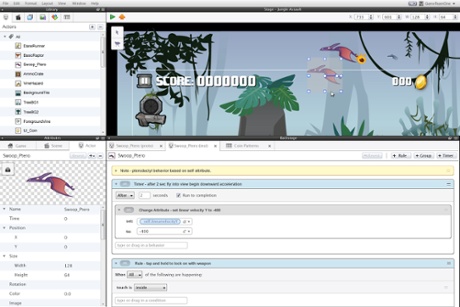Developers at Europe’s Newsgames Hackathon tell us which tools they recommend to those who want to make a game
Want to make a game but don’t know where to start?
We asked the developers at Europe’s first Newsgames Hackathon to tell us which tools novice developers can use to create their own games. Whether you want to tell a non-linear story using a text-based tool or get stuck in with some basic coding, here are the top five recommendations.
Each of these tools has a thriving community of users who provide video tutorials, artwork and help when you’re stuck. We’ve listed them from the easiest to the most difficult to use so you can get an idea of where you should start if you want to get into making games.

Twine is an open-source tool for those who want to tell interactive, non-linear stories. It is mainly used for text-based games, and it’s possible to fine-tune your game with images, CSS and JavaScript if you have the know-how. Depression Quest, the interactive game aimed at helping players to understand depression, was created using Twine and has gone on to win a number of awards.
The format is great, especially if you want to create a choose your own adventure type game.

Popular with those who want to create fun and educational games, Scratch is a good multimedia tool, especially if you want to create games for kids. Free of charge, it’s colourful and easy to use once you get the hang of it. You’re able to make your own sprites, add sounds and participate in a vibrant community of users which includes schools, museums and community centres.
GameSalad’s flagship project allows budding gamemakers to create and publish games for free on a number of platforms. The basic tools are free, but to access full features you need to pay for a Pro account. It has a community of some 700,000 developers from across the world who have created more than 200,000 games. The drag-and-drop interface is easy to get to grips with but, as with any tool, it can get complex the more you want to do with it.
4. GameMaker Studio
GameMaker: Studio caters to both novices and the more advanced gamemaker, allowing games to be created using both a drag and drop method or a scripting language for something a little more complex. Primarily running games with 2D graphics, it does let you use limited 3D graphics and you do have to pay for certain features. As this blogpost from GameMaker shows, some developers have been able to make a living off the games they’ve created using this software.
It’s a bit of a cheat adding this one to the list as Unity uses C# and JavaScript and does require at least a basic knowledge of code. But, if you’re willing to learn, there’s a lot which can be done with this game engine. When we asked 15 developers how to get into the games industry, several of them said Unity is a great starting point. Again, Unity has a huge community made up of plenty of people with the know-how to help people starting out. This post and this post both cover starting points for developers starting out without a huge knowledge of code.
----------
If you liked this article, please subscribe to our YouTube Channel for tech news, reviews and video tutorials. You can also find us on Twitter, Instagram and Facebook.





